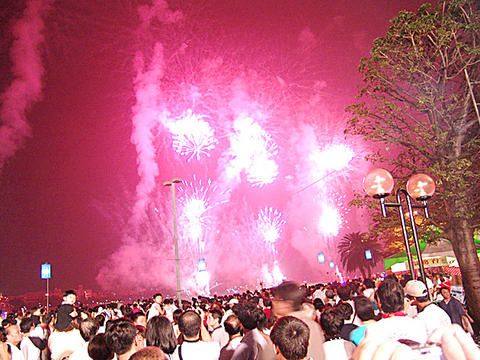The Kaohsiung Tsoying Wannian Folklore Festival (高雄左營萬年季), now in its seventh year, is second only to the Kaohsiung Lantern Festival (高雄燈會) in the calendar of cultural events in southern Taiwan. Held every October, it is an extension of traditional religious activities centered on the Tzichi Temple (慈濟宮) - originally dedicated to the Baosheng Emperor (保生大帝), it has since developed into a celebration of southern Taiwanese culture. With a mixture of religion, showmanship, fireworks and fun, the festival has been billed as Kaohsiung's response to Mardi Gras.
The festival is closely tied to southern Taiwan's history and takes its name, Wannian, from the old name of the Tsoying District, which under the administration of Koxinga (鄭成功) in the 1660s, was designated Wannian County. Religion also roots the festival firmly in the past, as the Tzichi Temple and the "welcoming of the fire lion," the centerpiece of the festival, date back to the early 18th century.
Given Tsoying's history as part of the first Chinese settlements in Taiwan, it is no surprise that temples abound. Ten major temples in the Tsoying area will all be holding their own activities as part of the festivities. The area around Kaohsiung's Lotus Lake (蓮池潭) will host traditional entertainments over the nine days of the festival, which starts tomorrow.

PHOTOS: COURTESY OF THE KAOHSIUNG CITY GOVERNMENT
The fire lion is regarded as the Baosheng Emperor's steed and messenger. Every year, a huge image of the fire lion made of bamboo and paper and containing slips of paper on which are written the hopes and prayers of devotees, is paraded through the streets and then set alight amid a shower of fireworks as the climax of the festivities.
A spokesperson for the Kaohsiung City Civil Affairs Bureau (高雄市民政局) said this year's festival, will be more accessible to people from around the island as the High Speed Railway is in service. Detailed information about the numerous events taking place can be found at cabu.kcg.gov.tw/ks2007/contents_04_1.html (Chinese only).

April 28 to May 4 During the Japanese colonial era, a city’s “first” high school typically served Japanese students, while Taiwanese attended the “second” high school. Only in Taichung was this reversed. That’s because when Taichung First High School opened its doors on May 1, 1915 to serve Taiwanese students who were previously barred from secondary education, it was the only high school in town. Former principal Hideo Azukisawa threatened to quit when the government in 1922 attempted to transfer the “first” designation to a new local high school for Japanese students, leading to this unusual situation. Prior to the Taichung First

The Ministry of Education last month proposed a nationwide ban on mobile devices in schools, aiming to curb concerns over student phone addiction. Under the revised regulation, which will take effect in August, teachers and schools will be required to collect mobile devices — including phones, laptops and wearables devices — for safekeeping during school hours, unless they are being used for educational purposes. For Chang Fong-ching (張鳳琴), the ban will have a positive impact. “It’s a good move,” says the professor in the department of

On April 17, Chinese Nationalist Party (KMT) Chairman Eric Chu (朱立倫) launched a bold campaign to revive and revitalize the KMT base by calling for an impromptu rally at the Taipei prosecutor’s offices to protest recent arrests of KMT recall campaigners over allegations of forgery and fraud involving signatures of dead voters. The protest had no time to apply for permits and was illegal, but that played into the sense of opposition grievance at alleged weaponization of the judiciary by the Democratic Progressive Party (DPP) to “annihilate” the opposition parties. Blamed for faltering recall campaigns and faced with a KMT chair

Article 2 of the Additional Articles of the Constitution of the Republic of China (中華民國憲法增修條文) stipulates that upon a vote of no confidence in the premier, the president can dissolve the legislature within 10 days. If the legislature is dissolved, a new legislative election must be held within 60 days, and the legislators’ terms will then be reckoned from that election. Two weeks ago Taipei Mayor Chiang Wan-an (蔣萬安) of the Chinese Nationalist Party (KMT) proposed that the legislature hold a vote of no confidence in the premier and dare the president to dissolve the legislature. The legislature is currently controlled